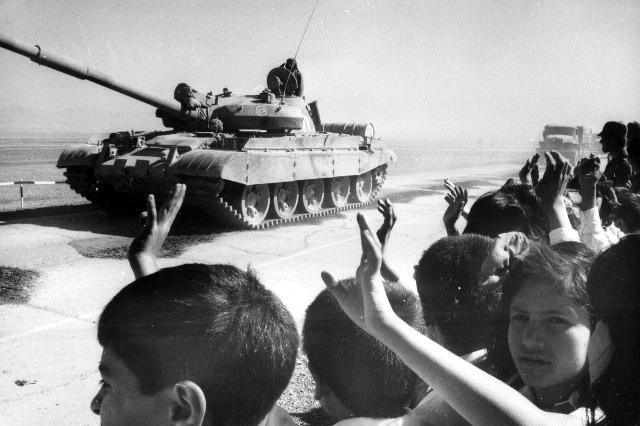Remembering 9/11 as the gateway to forever wars
Yesterday, we commemorated 9/11, a pivotal point in our nation’s history and whose lessons are begging to be learned. Not only were nearly 3,000 Americans senselessly killed that day, it marked the beginning of a series of protracted wars and engagements around the world, some that are still ongoing.
As executive director of the Committee for a Free Afghanistan, I worked with the Afghans from 1984–1989, mostly in DC. I supported the efforts of the late great Congressman Charlie Wilson (of “Charlie Wilson’s War”) to get the Afghans what they needed to defeat the Soviets and to provide whatever humanitarian aid and public support we could.
That meant helping to bring over Afghan children and villagers for free medical treatment in some of the finest U.S. hospitals. It meant supporting groups that provided MASH-unit style emergency medical services inside Afghanistan, whose medical infrastructure was decimated by the Soviets. It meant advocating for U.S.-made Stinger missiles that leveled the playing field and allowed for the Afghans to destroy Soviet MIG-fighters and HIND helicopters that would wreak destruction of Afghan villages within minutes. It meant me telling the late, beloved President Ronald Reagan in a White House meeting that he was going to make a mistake guaranteeing the UN accords on Afghanistan, which did not end the war but escalated it to new levels.
I came to Montana in early 1990, not long after the accords were signed and the Soviets had withdrawn, feeling dejected, knowing I could do no more, and knowing the outcome was not going to be positive. Thankfully, the U.S. never did provide the big bailout Gorbachev and the Soviet Union so desperately wanted to avoid collapse.
However, Afghanistan descended into civil war as predicted. Ultimately the Taliban, who were just kids in Pakistan-based madrasahs funded by Osama bin Laden and the Saudis when I was involved, took over. They gave safe harbor to Al Qaeda, were defeated by Coalition forces after 9/11, only to rise again after 20 years of war when the U.S. surrendered Afghanistan to the Taliban, who now rule with a reign of terror buttressed by $80+ billion in US military hardware left behind in Biden-Harris’ shameful withdrawal.
But I digress. On that fateful day of 9/11, I called Otilie, my blond-haired blue-eyed friend with whom I visited the region in 1986 and asked, what happened to Commander Ahmad Shah Massoud? Massoud, the legendary Afghan commander, was the revered and fearless leader of the Panjshir Valley, just northeast of Kabul, and the eventual leader of the Northern Alliance. Massoud treated his people well. They were provided an education. Women were respected and took on meaningful roles and aid and comfort were provided to visitors and friends.
As a Tajik, Massoud did not receive any direct U.S. aid through Pakistan. Massoud got his supplies by negotiating with rival groups and interdicting Soviet convoys along the Salang Highway en route to Kabul. Massoud survived multiple massive direct Soviet assaults and numerous assassinations attempts which only added to his fame.
On that initial call on 9/11, Otilie told me that she was the registered lobbyist for his Northern Alliance. I was immediately excited by the prospects of having a direct line to the man with whom we worked many years ago and whose leadership was widely respected.
That hope was dashed quickly as I discovered one day later that Massoud and a trusted ally whom I knew well, was murdered just two days before 9/11 by a terrorist disguised as a journalist, when his “camera” filled with explosives, detonated. I was further devastated: Massoud had the “receipts” on the Taliban and Al Qaeda and was their arch-rival. With him, we could more easily operate in Afghanistan.
In an attempt to be helpful, I launched a media campaign with the hopes of galvanizing public opinion urging the U.S. to work with the Northern Alliance to exact retribution on Al Qaeda and the Taliban. At that time, few people even knew where Afghanistan was located let alone who the Taliban or Al Qaeda were. The support, however, was almost overwhelming. I was on nearly every major national radio show and several national cable TV news programs. I had numerous offers from viewers and hosts wanting to do something, to relaunch my old group… something. It took a couple of months but the U.S. ultimately aligned with the Northern Alliance.
Within two months we decimated Al Qaeda, inflicted heavy casualties on the Taliban, and had bin Laden surrounded in Tora Bora (eastern Afghanistan), but our ground forces were directed to let him escape.
We should have been in and out of Afghanistan in two months—not 20 years. And in no way should have extended the “war on terrorism” any further.
But every September 11, we honor those who were killed in New York, my place of birth, at the Pentagon, and Pennsylvania. I hope to God we’ve learned the lessons of the past. We have seen too many lost lives, too many lives ruined by purposeless wars, and too many of our freedoms eroded.
We do best in honoring those who are no longer with us by always remembering their lives, and by learning the lessons of the past and affirming to never repeat them again.
Henry Kriegel was the executive director of the Committee for a Free Afghanistan, prior to moving to Montana in 1990.

Image: Public domain.





